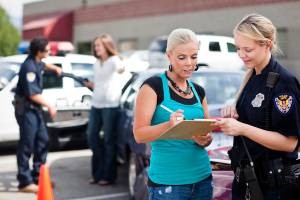How Important is the Police Report After a Car Crash?
 One of the first thoughts many car crash victims have in the moments after the crash is about calling the police. Victims want police officers at the scene to investigate, issue traffic citations and complete a report on the crash.
One of the first thoughts many car crash victims have in the moments after the crash is about calling the police. Victims want police officers at the scene to investigate, issue traffic citations and complete a report on the crash.
While it is true that it is important to call the police after a crash, particularly if you want to have a chance of obtaining compensation for your vehicle or body damages, there are limitations to police reports. Below, learn more about how police reports can help car crash claims and some of the limitations.
Our Bloomington auto accident attorneys offer a free legal consultation to discuss your crash and the damages you have suffered. We understand what car crash victims go through because we have helped so many obtain compensation for car crash damages. The consultation is free and comes with no legal obligations, which means no risk to you.
How a Police Report Could Help Your Claim
A police report provides an unbiased, third-party account of a crash, and police officers’ accounts of crashes are often considered reliable. People who witnessed the crash are also more likely to talk to police officers about what they saw because they often trust the police. The witness’ recollection is also best right after the crash versus several weeks or months later. The at fault party may also “admit” what they did at the crash scene, but later have a change of heart and start to forget or change their story.
Police reports provide basic details about the situation, including things like the weather, date, time, damage to the vehicles, road conditions in the area, traffic citations that were issued and contact information for witnesses. Sometimes police reports contain the responding officer’s opinion about who was at fault for the crash.
Police reports are often used in the insurance claims process, as they provide a lot of information that can be used in your demand letter for compensation.
While every insurance policy is unique, there may be a requirement to file a police report in order to obtain compensation. In fact, there are several Minnesota policies that will not allow a claim unless a police report is filed. The State of Minnesota also requires you to file a police report when a crash fits certain criteria.
However, even if you are unsure if the crash fits these criteria, you should err on the side of caution and call the police anyway. Your injuries could be much worse than you initially realize. Crash victims have a tendency to minimize the severity of their injuries, unless there is a lot of blood or there are broken bones. Even a basic description of an injury at the crash scene helps explain later pain and treatment that was needed. Of course, medical records will have details about the injury, but the report can buttress the other records.
A police report helps to connect your injury to the crash. Without a police report, the insurance company is likely to question whether your injury happened in the crash or in another incident.
Limitations of Police Reports
Unfortunately, police reports generally cannot be admitted as evidence in a trial. These documents are considered hearsay, as the police officer has no direct knowledge of the crash. The report is not as reliable as an account from someone who was either involved in the incident or actually witnessed it. However, the police report can be used to refresh an officer’s memory, so they can testify with a better memory of the events that usually took place years before.
While there are limitations to a police report, most car crash claims are resolved through an insurance company settlement. That means most crash victims do not need to go to trial to recover compensation for their damages.
Injured in a Car Crash? Call Today to Discuss Your Situation with a Licensed Lawyer
After calling the police and seeing a doctor, an important next step is talking to an experienced attorney about your crash. You may be eligible for compensation for damages as the crash may have been caused by another driver’s negligence, such as drunk or distracted driving.
Your free initial consultation is a chance to learn more about how we may be able to assist you during this difficult time. You are not under any obligation to hire our attorneys to represent you if we validate your claim. That means no risk to you in meeting with us.
Call us as soon as possible to set up a free legal consultation. Phone: (612) TSR-TIME.



